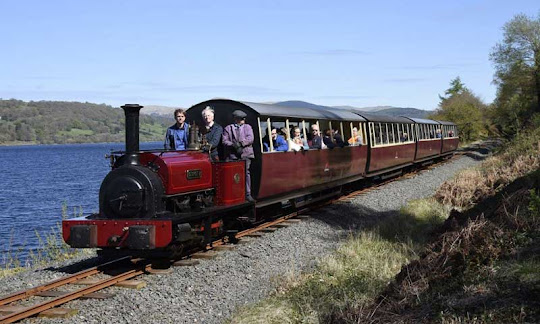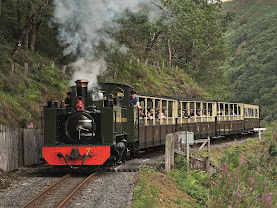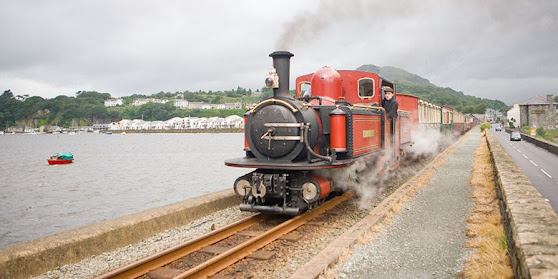As we continue with the latest lockdown during 2021 having another look ahead to better times when hopefully we can visit some more of our Heritage Railways. In part one we took a look at some of the relatively local GWR based heritage railways and then we moved a little further down the line for part two towards Bristol and the West where there are several lines which have survived into preservation.
In part three we head over the border into Wales, some of my favourite childhood memories of the many steam trains here and visits with my father. Summer holidays to Llandudno and Aberystwyth were not complete with the obligatory day out on the 'Great little trains of Wales'. I sadly haven't been to visit these for some time, and hopefully will be able to start rectifying that sometime this year.
Vale of Rheidol Railway
https://www.rheidolrailway.co.uk/
Former Great Western Railway line and run under British Railways from 1948 until privatisation in 1989, it's now a heritage line owned as a charitable trust with the original GWR loco's restored to their Green and Gold livery. The 11.75 mile journey takes approximately one hour in each direction. Listen to the sound of a powerful narrow-gauge steam locomotive working to climb up 700ft (200m) from Aberystwyth to Devil's Bridge
The Vale of Rheidol Railway re-creates the Edwardian spirit of adventure. Since opening in 1902, millions have enjoyed the scenic trip through the ancient woodlands to Devil’s Bridge, home of the famous waterfalls, nestled in the magnificent Cambrian Mountains. The railway is charming, a masterpiece of engineering opened to carry lead ore, timber and passenger traffic. The narrow-track gauge allows the railway to follow the contours of the terrain with many sharp curves and steep gradients. Trains normally wait for one hour at Devil's Bridge station before returning to Aberystwyth. You can also alight at one of the recently restored intermediate stations and explore the many walks the valley has to offer. The vintage steam engines and carriages were built for the line by the Great Western Railway in the 1920s / 30s, now restored, they are still operating on the trains today.
Talyllyn Railway
2021 Celebrating their 70th Anniversary.
https://www.talyllyn.co.uk/
Enjoy the stunning scenery of Southern Snowdonia, stepping back in time to enjoy the 14.5-mile round trip, which has been running along the same route since 1865 it's also the world's first preserved steam railway and would be looking to celebrate their 70th Anniversary in 2021.
In 1951 the railway was taken over by the Talyllyn Railway Preservation Society, the first such in the world, and it is the volunteer members of the Society together with a small dedicated full-time workforce who run the Railway today.
Two original Victorian steam locomotives and four passenger coaches are still in regular use, together with others which have been built or acquired over the years. The original Victorian train which opened the line runs on selected Thursdays, and this trip includes a personal tour guide. The stations are at Tywyn Wharf (connecting to the Cambrian Coast Line), Pendre, Rhydyronen, Brynglas, Dolgoch Falls, Abergynolwyn and Nant Gwernol.
UNESCO World Heritage Site Bid: Llechi Cymru Welsh Slate
The Talyllyn Railway, Bryneglwys quarry and Abergynolwyn village are an important part of this bid which has been through a lengthy submission process and is the UKs preferred application in 2019, the decision should be known sometime in 2021 from UNESCO. Good luck / Pob lwc.
Ffestinogg Railwayhttps://www.festrail.co.uk/about/
The Ffestiniog Railway (above) is the oldest independent railway company in the World today, built to serve the slate industry of Blaenau Ffestiniog in 1832, now with the rebuilding of the pre-war Welsh Highland Railway complete, and a new £1.25 million two-platform layout at Harbour Station at Porthmadog (complete with a substantial semaphore signalling installation), it is now possible to connect with Caernarfon-bound trains and experience 40 unbroken miles of spectacular narrow-gauge steam. While the railway has a huge history with regards to the modern tourist railway we have now we have to bring us up to the 1990s, when the FR became involved with the Welsh Highland Railway (WHR) again with a plan to start at Caernarfon, rebuilding back to Porthmadog and connecting with the Ffestiniog to create a 40 mile railway – a new “Great Railway Journey”. Following the closure of the Beyer-Peacock works, the FR saved the pioneer Garratt locomotive ‘K1’, which had spent its early life in Tasmania. The locomotive became an exhibit at the National Railway Museum after plans to convert it to fit the FR loading gauge were dropped, so as not to affect the heritage outline of this historically important locomotive.
In 2003 the line was reopened as far as Rhyd Ddu and tracklaying was completed through to Porthmadog in early 2008, with the volunteer track gangs building a new railway the same length as the Ffestiniog in just three years. During the space of just one week, the tracklayers built a mile of railway! Public services started to Beddgelert, then Hafod y Llyn in 2009 and Pont Croesor in 2010. The final link to the FR opened in April 2011, finally enabling through services to operate between Blaenau Ffestiniog and Caernarfon. This is a MUST visit for me when it's possible to holiday again as it would required a week away to fully explore this location and the Snowdon mountains too.
Bala Lake Railway
https://bala-lake-railway.co.uk/
The Bala Lake Railway is a 4½-mile narrow gauge railway, established over 40 years ago on a former Great Western Railway track bed. The visitors are almost all entirely tourists and it is one of the thirteen narrow gauge railways of Wales. Deep in the heart of the Snowdonia National Park from its start point at Llanuwchllyn, the line runs parallel to Bala Lake and descends to almost lake level offering the visitor spectacular views of the lake itself and the lush surrounding pasture and woodlands that leads the eye to the stunning vista of mountains Arenig Fawr, Aran Benllyn and Aran Fawddwy. Picnic sites at Llangower provide the perfect spot for a break in the journey on a summer's day for a picnic on the foreshore.
The line currently terminates at Pen y Bont, a remote terminus some 1,200m from the town itself. With limited parking, a poor visible profile and no amenities, passengers rarely venture into Bala Town and visitors to Bala Town are largely unaware of the railway's existence.
 The Red Dragon Project, under the auspices of the Bala Lake Railway Trust, has been established to build a £3.5 million extension into the town of Bala and fulfil the potential of one of Wales' most scenically beautiful railways.
The Red Dragon Project, under the auspices of the Bala Lake Railway Trust, has been established to build a £3.5 million extension into the town of Bala and fulfil the potential of one of Wales' most scenically beautiful railways.






No comments:
Post a Comment